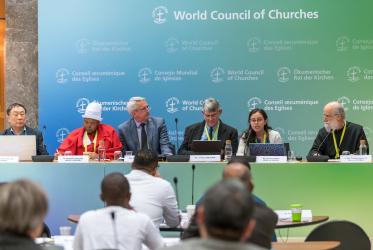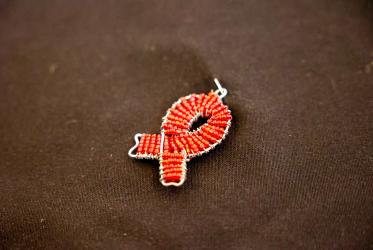HIV/AIDS
A policy statement from Norwegian Church Aid
Approved by NCA Board 29 September 2003
1. The Challenge
The UN General Secretary Kofi Annan has said that HIV/AIDS is the greatest development and humanitarian disaster of our times. The consequences of the epidemic, both at individual and societal level, are disastrous and require attention from actors at all levels in society. The challenges connected to fighting the epidemic are therefore many and diverse, also for NCA's priorities and strategies. Among them are:
AIDS hinders development at all levels
HIV/AIDS and poverty is a viscous circle. Evidence show that households can experience severe financial and social difficulties when one or more family members fall ill. Loss of income and increased expenditure on different forms of treatment lead to increased household poverty. Peasant farmers affected by AIDS may have to turn to less labour intensive crops, decreasing the agricultural output. This further exacerbates household poverty and may threaten food security at all levels. Increased poverty leads to increased risk of being HIV infected. New survival strategies may result in more migration, and poverty can lead women and children to exchanging sex for money or goods in order to feed their families.
Efforts to achieve education for all and improve the quality of education sectors are being hampered by HIV/AIDS. Poverty at family level, combined with a need for care-taking of sick family members often result in children (especially girls) dropping out of school. In some countries, teachers are dying at twice the rate of which they are trained1, leaving the education sector with few possibilities of improving.
In countries with high HIV prevalence, AIDS has a documented negative impact on per capita gross domestic product (GDP), and the impact on the informal economy is likely to be more severe than on the formal economy. In the world of work, increased absenteeism and loss of skilled labour pushes costs up whilst lowering productivity and compromising quality. This may in turn discourage both investors and customers, further contributing to the circle of poverty and hindering development.
Gender:
Women and men are affected differently by the epidemic. It is therefore necessary to address gender when dealing with HIV/AIDS, as unequal gender relations are driving the epidemic and women are disproportionately affected. Women also bear the psychological and physical burden of AIDS care for family members. Ideas of masculinity promoting multiple partners using no protection and often in combination with drugs and alcohol endanger men, their partners and future children.
Stigma:
Stigma and discrimination of people living with and affected by HIV/AIDS are among the gravest consequences of the epidemic. Stigmatisation related to HIV/AIDS plays into, and strengthens existing social and economic inequalities - especially related to gender, sexuality, class and race - undermining the fundamental human dignity of individuals and families. Men and women encounter different forms of stigma and discrimination based on their real or perceived HIV status. Women are particularly vulnerable to such stigma, due to their already subordinate position. Homo -/bisexual men are also very vulnerable to severe forms of stigma and discrimination, as an HIV diagnosis adds to their already marginalized position in many countries2. The majority of HIV positive drug users are men, many of whom are criminalized, stigmatised and marginalized by their drug use. Their belonging to an already stigmatised group often hinders or delays their access to treatment for AIDS related symptoms3.
Stigma and discrimination add a heavy psychological toll to people who are already burdened both physically and mentally due to their own or their relative's HIV infection. In its gravest forms, stigma and discrimination may hinder access to education, employment, health care, accommodation and enjoyment of other rights. This represents a major obstacle for people's - and in turn communities' - ability to cope.
Stigma and discrimination is also an obstacle to all forms of HIV/AIDS interventions; Openness and trust is key to the success of all prevention and care programmes, and Voluntary Counselling and Testing is made difficult due to the stigma connected to visiting clinics who offer such services.
Unfortunately, mandatory testing of certain groups of people is practised in some countries. This is very problematic from a human rights perspective as well as from a preventive perspective. In order to create a conducive environment for dialogue, information and possible behaviour change, testing should be done voluntarily, based on thorough pre- and post-test counselling.
Young People
An estimated 12 million young people aged 15-24 is living with HIV/AIDS, and the numbers are rapidly increasing. About half of all new adult HIV infections occur among young people4. However, if people are given the right tools and support to protect themselves from HIV infection at young age, it is likely that many of them will avoid HIV infection also later in life.
As of end 2002, 14 million children have lost one or both parents to AIDS. Approximately 80% of these live in Sub-Saharan Africa. Forecasts indicate that these numbers will rise dramatically over the next 10-20 years5. Due to their marginalized positions, these children are more likely to drop out of school and less likely to visit health care facilities, and are thus more difficult to reach in terms of life saving information.
Political conditions
The debate around the HIV/AIDS epidemic has become increasingly politicised over the last years. HIV/AIDS is now an issue for national authorities as well as international bodies like the UN, the World Bank etc. This indicates that the need for well-targeted advocacy is present.
Some 95% of the people living with HIV/AIDS live in developing countries, whereas the majority of the debate around the issue takes place in the resourceful layers of the population of the developed world. This is a great dilemma in terms of advocacy: Whose voices are heard, and whom do they speak on behalf of?
The issue of access to comprehensive health care for all, including treatment with antiretroviral drugs as well as drugs for opportunistic infections, is still a major challenge as lack of care and treatment represents a major threat to human dignity and is a violation of human rights.
HIV/AIDS in faith based settings
Also churches and other faith-based entities are living with HIV/AIDS. Many churches and religious communities around the world have done remarkable efforts both within HIV prevention and care for those infected and affected. Religious communities have an enormous potential in combating the epidemic. They can play a crucial role in prevention, care and advocacy if this potential is released, and it is thus a challenge to identify the mechanisms that allow for the full involvement of these communities in all aspects of HIV/AIDS interventions.
HIV/AIDS has however proven to be a challenging and demanding task for many faith-based entities to take on and talk openly about. In such settings, there is often no tradition of talking openly about sexuality and sexual behaviour - issues that are often surrounded by shame and secrecy. HIV/AIDS has for some become the "proof" of sinful behaviour, even though this is by no means the case. Traditional approaches to gender roles and sexual ethics have many times led to stigmatisation and rejection rather than compassion. It is therefore necessary to recognise that churches and other faith-based entities have often contributed to, instead of reduced the stigma and discrimination of people infected and affected by HIV/AIDS. They have also in many instances made preventive measures difficult because of the silence that surrounds issues related to HIV/AIDS and its root causes - among them the inequalities and power imbalance between women and men.
2. NCAs policy statement
Vision
Our vision is a just world where the HIV epidemic is curbed and people living with and affected by HIV/AIDS can live a life in dignity and with respect for their rights.
Policy priorities
According to our Christian belief all human beings are created in the image of God, giving fundamental rights and dignity to all people. NCA is therefore committed to working with HIV/AIDS from a human rights perspective. The work against stigma and discrimination must therefore be of high priority and should be visible in all NCA-supported projects.
HIV/AIDS programs should be implemented through all three of NCA's modes of operation: emergency response, long-term sustainable development and advocacy work.
Overarching principles for NCA's HIV/AIDS work:
-
Emphasis will be on promoting human rights and defending human value for children, men and women.
-
Gender sensitivity and relevance must be sought in all activities, and women's sexual and reproductive rights must be promoted
-
Activities must reflect and respect the local cultural situation, and should be planned in co-operation with partners and local communities, including people living with HIV/AIDS
-
An holistic approach should be sought in all activities, and prevention and care should always go together
-
Together with other community members, NCA partners should give focus to "positive living" and underline the message of "living with HIV/AIDS" instead of "dying of AIDS"
Approaches
Since NCA believes that HIV/AIDS is not just a health issue, but also a development, gender, social, cultural and economic issue, our main focus for intervention is threefold;
-
Prevention
If the global HIV/AIDS epidemic is to be curbed, work to prevent the spread of HIV is essential. Unless the number of new HIV cases is reduced, the possibility to give proper care for those infected is also further diminished. Promoting condom use as well as female-controlled prevention measures (e.g. femidome as well as developments within e.g. microbicides) and giving emphasis to women's sexual and reproductive rights are important components in the preventive work, in addition to focus on behaviour change and the provision of sustainable alternatives to high risk activities.
-
Care and support
NCA wants to promote palliative care6 and support. This should include pastoral and psychosocial care (self help groups etc), in order to take care of people's spiritual and social needs. Care and support must be offered not only to those infected, but also their families, caregivers and health providers.
-
Advocacy
HIV/AIDS has become increasingly politicised over the last years, as it has been lifted up to the international political agenda. Large financial resources have been released, and it is thus more important than ever before to secure that the voices of the poorest and most vulnerable are heard and that interventions are based on their priorities and needs. The issue of access to treatment and care for all will become more and more important also in NCA's project areas as research and progress will make e.g. ARV treatment increasingly feasible also in resource-poor settings. This will demand that NCA keeps track of the developments and advocates strongly for increased quality of the basic health care facilities in poor countries, so these systems are capable of distributing and managing ARVs when they become available.
A main focus will be on securing women's rights as their realities are often overlooked in conventional HIV-strategies
Counselling is an important part of prevention, care and support. NCA will therefore advocate for the establishment of high quality VCT services that are widely available, and strictly oppose mandatory testing.
Interventions within these three areas are subject to some overall policy considerations both in terms of choice of actors and in terms of content:
Actors and Arenas
NCA:
-
NCA will develop a clear staff policy and code of practise on HIV /AIDS, where the rights of HIV positive staff and job applicants is secured. NCA will also encourage all partners to have a clear staff policy on HIV/AIDS, in order to avoid stigmatising and/or discriminatory attitudes and practises. Continuous dialogue on these issues are of crucial importance to secure the rights of people living with HIV/AIDS, and to help our own organisation and our network to fully understand and grasp the realities of this global epidemic.
-
NCA is committed to fighting all forms of HIV/AIDS related stigma and discrimination7. Organisations or constituencies who knowingly and systematically practise discriminatory practises towards PLWHA should thus be held accountable for this, in close dialogue and follow-up from NCA.
Stakeholders:
-
Local grassroots' organisations will remain the major implementing partners of NCA in HIV/AIDS service delivery and advocacy. But there are also other stakeholders that NCA will seek to work with in order to make our HIV/AIDS work as comprehensive as possible. These will include:
-
International bodies (UN, WCC, EAA etc)
-
National authorities (Norwegian and others)
-
Ecumenical sister-organisations
-
Interfaith bodies
-
Organisations for PWLAs at all levels
-
Business
-
Own employees
Partners:
- NCA will give priority and support to local initiatives through church-based and other religious organisations, traditional healers, and other local organisations including organisations for HIV-positive people and their families.
- The main bulk of NCA's partners are church-related. Churches and other religious bodies have a natural mandate when dealing with ethical and moral issues such as life, love, sexuality and behaviour. We therefore recognise and emphasise the special responsibility of religious actors for dealing with the epidemic.
- NCA will, as an ecumenical and diaconal organisation, challenge the churches to fulfil their diaconal and prophetic role in regards to the right to a full life with dignity in face of the HIV/AIDS epidemic. Based on this, work against stigma and discrimination must be given priority in all NCA supported projects. In this context it will also be important to give HIV-positive people the possibility of a more specific theological reflection on the pandemic.
- NCA will focus on an increased co-operation and network building-between organisations working with HIV/AIDS, including organisations for PLWHA.
- NCA will prioritise partner initiatives to provide education about gender relations and sexual behaviour specifically targeted at young women and men. The life situation and needs of young people will be central.
- NCA will seek to strengthen the HIV/AIDS advocacy work that is being carried out by our partners and networks. This should be seen as a supplement to and a reinforcement of the service delivery our partners provide.
1 Richard Feachem in Washington post, January 2003
2 HIV/AIDS and gender: An awareness raising folder by The Norwegian working group on HIV/AIDS and gender, 2001
3 Ibid
4 UNAIDS, July 2002: Report on the global HIV/AIDS epidemic
5 Ibid
6 Palliative care is about caring for people with a terminal illness as well as their families and friends. Palliative care aims to ease the pain, distress and many other physical, emotional and spiritual problems that are present with a terminal illness. Using various techniques and knowledge, a team (including e.g. doctors, nurses, allied health workers, chaplains or volunteers), provides coordinated physical, psychological, emotional and spiritual support. Palliative care aims to make the person feel in control of their treatment and their quality of life. It involves family and friends, recognising that they, too, need to be prepared for the illness and/or death of someone they love, as well as being there to offer help and support during the grieving process (taken from/adjusted from Palliative Care Australia homepage:www.pallcare.org)
7 See "NCA position on HIV/AIDS related stigma and discrimination" (2002) for more detailed strategies and program implications on this particular area





